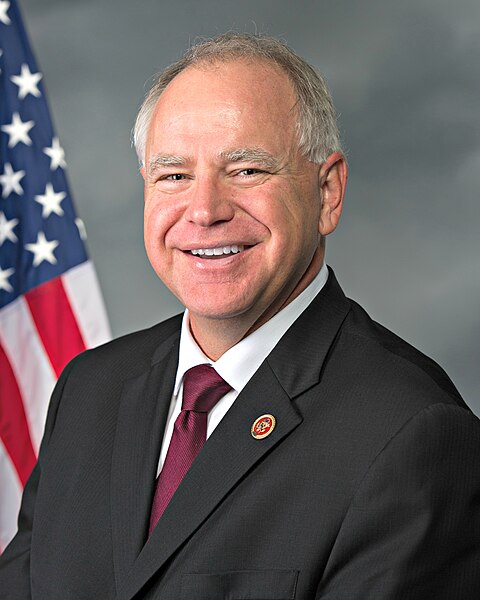
Democratic presidential candidate Kamala Harris selected Minnesota Governor Tim Walz as her running mate on Tuesday, choosing a straightforward speaker from America's heartland to help
challenge Republican rival Donald Trump.
Walz, 60, has been Minnesota's Democratic governor since 2018 and is a U.S. Army National Guard veteran. He has also been a schoolteacher, football coach, hunter, and gun owner, which gives him deep connections to rural American voters who have recently leaned towards Trump. These qualities make Walz a strong partner, according to a source close to the selection process.
Harris, 59, became the Democratic frontrunner after President Joe Biden, 81, ended his reelection campaign under party pressure last month. Since then, she has raised hundreds of millions of dollars, invigorating the race against Trump with renewed energy from her party's base.
"Tim is a battle-tested leader with an incredible track record of delivering for Minnesota families," Harris told supporters in a text message. The source highlighted Walz's executive experience as a significant advantage.
Walz has championed a progressive agenda, including free school meals, climate change goals, middle-class tax cuts, and expanded paid leave for workers.
Trump campaign officials quickly responded to the selection, framing Walz as a liberal like Harris with values they claim are out of touch with most Americans. "It’s no surprise that San Francisco Liberal Kamala Harris wants West Coast wannabe Tim Walz as her running mate – Walz has spent his governorship trying to reshape Minnesota in the image of the Golden State," the Trump campaign stated, referring to Harris' home state of California.
Harris, the daughter of immigrants from Jamaica and India, is adding a popular Midwestern politician whose home state reliably votes Democratic in presidential elections. Minnesota is close to Wisconsin and Michigan, two crucial battleground states.
Walz was relatively unknown nationally until the Harris "veepstakes" heated up, but his profile has since risen. Harris chose him over popular Pennsylvania Governor Josh Shapiro.
Harris was expected to appear with Walz at an event in Philadelphia on Tuesday evening. In the November 5 U.S. election, they will face Trump, 78, and his running mate JD Vance, a 40-year-old military veteran from the Midwest. Vance said he called Walz to congratulate him and left a voicemail, while also criticizing the Democratic ticket's stance on immigration, crime, and energy.
The George Floyd Factor
Walz has faced criticism, particularly from Republicans, over his handling of the protests following the May 2020 killing of George Floyd by a white Minneapolis police officer, who was later convicted of murder.
Critics argued that Walz was too slow to mobilize forces to stop the looting, arson, and violence that accompanied the protests in Minneapolis. Walz and his team have stated that they addressed the issues as effectively as possible, including deploying the National Guard.
Rev. Al Sharpton, founder and president of National Action Network, praised Walz for responding to calls for justice by assigning the state's attorney general to lead the prosecution in Floyd's case. The officer was sentenced to more than 20 years in prison. "I learned then that he was a man who will listen and do what is right by those he represents," Sharpton said in a statement.
Walz on the Attack
Walz has gained prominence recently, partly due to his use of the term "weird" to describe Trump and Vance, an insult that resonated with the Harris campaign, social media, and Democratic activists.
His straightforward criticism has struck a chord more effectively than the broader critiques of Trump by others. Walz has also challenged Trump's and Vance's claims of middle-class credentials. "They keep talking about the middle class. A robber baron real estate guy and a venture capitalist trying to tell us they understand who we are? They don't know who we are," Walz said in an MSNBC interview.
While Walz supports Democratic orthodoxy on issues like legalized abortion, same-sex marriage, and the Affordable Care Act, he also maintained a centrist voting record during his congressional career. He was elected to a Republican-leaning district in the U.S. House of Representatives in 2006 and served 12 years before becoming governor of Minnesota in 2018 and again in 2022.
Walz’s shift from a centrist congressman to a more progressive governor may reflect the demands of voters in major cities like Minneapolis-St. Paul. "He runs the risk of reinforcing some of the worst fears people have of Kamala Harris being a San Francisco liberal," said Ryan Dawkins, a political science professor at Minnesota's Carleton College.
Walz counters criticism effectively. "What a monster. Kids are eating and having full bellies, so they can go learn, and women are making their own healthcare decisions," Walz said in a July CNN interview. "If that's where they want to label me, I'm more than happy to take the label."
As governor, Walz mandated face coverings during the COVID-19 pandemic and signed a law making marital rape illegal. He presided over several years of budget surpluses in Minnesota leading to his 2022 reelection. "Walz fostered a pro-business climate, attracting substantial investment and positioning the state as a top contender for business development," said LinkedIn founder and Democratic donor Reid Hoffman. "I'm confident that as VP, he'll continue to protect America's innovation power and fuel economic growth." Photo by United States Congress, Wikimedia commons.






































